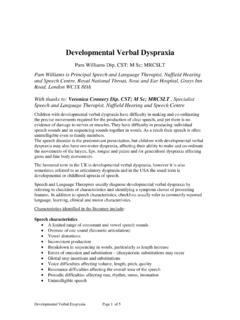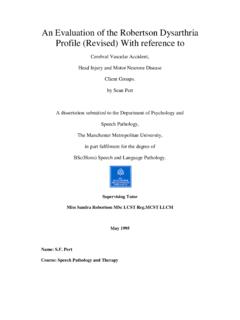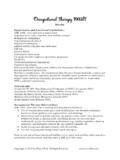Transcription of DCD/Dyspraxia and the role for Occupational …
1 Zi Mei Events Zi Mei Events Ph/Fax (07) 3358 3689 PO Box 2680 New Farm Q 4005 DCD/Dyspraxia and the role for Occupational Therapy Alabaster Room, Victoria Park Function Centre Herston Rd, Herston - Brisbane Friday 5th - Saturday 6th May, 2018 9:00am 4:30pm Developmental co-ordination disorder (DCD), also known as dyspraxia , is a motor impairment that presents in early childhood and significantly impacts upon a child s ability to organise and direct their body to perform efficient motor sequences. A child with DCD will demonstrate a performance in daily activities that is below that expected for his or her age or opportunities for learning. While DCD is not related to a child s intelligence, it can make it more difficult for them to learn and participate in learning and school-based tasks. DCD has a high incidence of co-morbidity with other neuro-developmental conditions including ADHD, Autism Spectrum Disorder, Intellectual Disability and other learning difficulties.
2 Depending on the severity of symptoms, DCD/Dyspraxia can have a significant impact across the life span. Occupational Therapists working with children with DCD, can provide intervention across a number of domains and difficulties experienced by these children and their families, including: physical health and well-being and participation in leisure pursuits social engagement and self-esteem areas of daily living including self-care/self-maintenance academic tasks such as handwriting, organisation and planning Through the extensive use of case studies, this two day workshop will assist Occupational therapists to explore ways they can work more effectively to assist this population across a variety of domains and environments. Workshop Aims The workshop aims to be practical in nature, providing participants with: an ability to define what is praxis vs DCD. an overview of the underlying causes for difficulties an ability to identify functional implications for dyspraxia an understanding of the OT role in diagnosis and prognosis a clinical reasoning framework to choose the most appropriate assessment tools/process a clinical reasoning framework to employ effective treatment approaches for praxis intervention.
3 The workshop will include video and case studies to assist participants integrate their knowledge and skills. Arrival tea/coffee, morning tea, afternoon tea and lunch provided. This workshop is open to Occupational therapists. About the Presenter Lisa Scott (Occ Ther) Lisa completed her undergraduate training at La Trobe University in 1989. Her work has taken her to many, many pre-schools and schools on 3 continents over the past 23 years. She currently spends 2 out of 6 days in her private practice working in school settings. Lisa has completed study related to working in schools, with Mary Benbow in Boston, Rhoda Erhardt in Pennsylvaia, at the Ayres clinic in California and of course in Australia! She is SIPT- certified and has also completed NDT certification. Lisa enjoys using the best treatment approaches for each child she sees, based on the issues they present with. Registrations for this workshop are now open. Please register online at Further workshop enquires can be forward to Zi Mei Events on or (07) 3358 3689.
4







